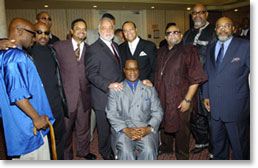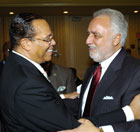CHARLENEM

LOS ANGELES (FinalCall.com) – The 350 participants of the Dec. 17 Urban Issues Breakfast Forum who walked into the Furama Hotel’s banquet room to hear the Honorable Minister Louis Farrakhan revisit the Million Man March, as its 10th anniversary approaches, strode away with renewed commitment, faith and goals to further empower their communities and constituents.
“The brilliance that is among our leaders is vitally necessary to help our people do what must be done in this hour,” Minister Farrakhan told the group of political, spiritual and street peace leaders, businessmen, educators and civic representatives. “I am deeply concerned about the condition that I may leave our people in, if I and you don’t collaborate. It’s bigger than the Nation of Islam as the Nation is currently structured. It’s bigger than the NAACP, the Urban League, the Brotherhood Crusade, or US.”

The forum, managed by author and columnist Anthony Asadullah Samad, brought together a broad spectrum of community leadership, including Nation of Islam Western Regional Minister Tony Muhammad; Danny Bakewell Sr., Los Angeles Sentinel newspaper publisher and owner and Brotherhood Crusade executive director; Bishop H.H. Brookins of Brookins African Methodist Episcopal Church; Dr. Maulana Karenga, California State University Long Beach Black Studies Chair and Kwanzaa founder; Jim Brown, National Football League Hall of Famer and executive director of Amer-I-Can, a gang intervention and prevention organization; Bo Taylor of gang intervention groups, Unity One and Unity Two; and Stan Muhammad, executive director of Venice 2000, an intervention and prevention effort.
The world renowned leader began by highlighting the strengths of the individuals and organizations present, while cautioning that some Black leaders have become dangerously comfortable. He urged teamwork between community elders and the rising youth leadership for the good of all.
Min. Farrakhan also discussed how envy and jealousy among various community leaders are used to thwart the collective’s progress, and then quickly administered a remedy. “Those of us in leadership who have a fairly comfortable life must not allow ease to become dis-ease,” he implored the group of leaders, “because, if we who are in leadership fail to accept the challenge that is before us today, God is already in the process of raising new leaders to replace us.”
Mr. Bakewell labeled Min. Farrakhan’s call magnificent. “I’m honored, humbled and certainly energized to have been asked to be one of the conveners, along with Dr. Maulana Karenga and Brother Jim Brown, to really, really see if we can’t move our people nationally to a place that will institutionalize our ability to respond to our own needs,” he stated.
Min. Tony commented about the gang interventionists’ importance in the process. “His (Farrakhan’s) mind is on the masses, and not on the classes. The Minister’s job is to help lift the poor,” he said, “so he never leaves out the street organizations–the brothers who are in the bottomless pits of hell, where there’s fire, where there’s fury, where there’s war, where there’s mayhem and bloodshed.”
For Dr. Karenga, who penned the Million Man March Day of Absence Mission Statement, Min. Farrakhan’s call was, yet again, historic. “As Brother Minister Farrakhan said, this is a critical juncture in our history. It is important for us to seize the moment and develop a philosophy, structure, program, communication system and resource base to do the group-work that is before us, and to work in such a way that we leave a legacy worthy of the name and history African,” he said.
That legacy, Min. Farrakhan asserted, is with the youth. “You call them gangs, but you’re the elders and disorganized–and they are the children and they are organizing,” he pointed out. “The streets are controlled by young people who do not care about us because of the way they feel we have neglected the responsibility to serve our people as we should,” he continued.
Other community representatives present included educator Professor Amen Rah, Mary Alice Jones (Western Region Director-Congress of Racial Equality), Dr. Donald Evans, Sr. and Nathaniel Ali (National Association of Brothers In & Out of Prison-NABSIO), Khalid Shaw, Kenneth K.B. Bell and Dane Staten (Stop the Violence Increase the Peace), Vickey Lindsey (Project Cry No More), Dorothy Freeman (Families to Amend California’s Three Strikes Law) and Richard Byrd (aka Meri Kara, Kryst Unity Center).
“It may be strange, because people who have looked at the Nation of Islam–not Believers–never really knew whether they really stood for all Black people or just stood for the Black Muslims in America,” explained gang interventionist Bo Taylor. “This coming together and uniting these agencies will really showcase the capability of change and the inclusion of all human beings.”












